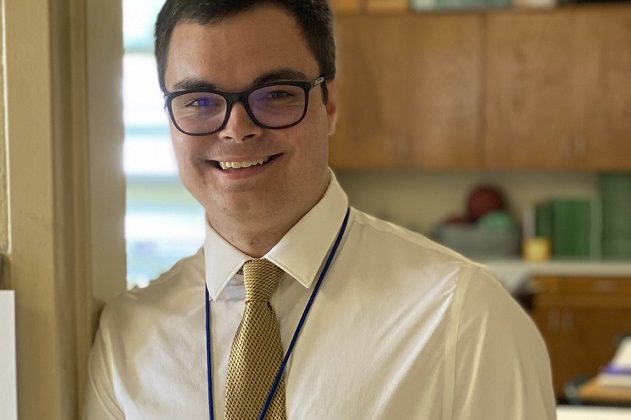
By Susan O'Rourke | January 10, 2022
We were able to learn from distinguished professors and prominent members of the indigenous community. I often say “the best professional development is from the teacher down the hall.” It was great to be able to learn from and collaborate with other educators across North Carolina—something we as teachers rarely get to do!
This month UNC World View is thrilled to celebrate the work of Matt Daniel. Matt Daniel is a 5th grade teacher at Sam D. Bundy Elementary School in Farmville, North Carolina where he also serves as grade-level chair and PLC facilitator. We are happy to recognize that Matt was recently named Teacher of the Year at Sam D. Bundy Elementary School and is a finalist for Pitt County Schools District Teacher of the Year. Matt also received the Impact Ventures Grant from Pitt County Schools in 2018.
Matt’s fascination with the social sciences was first sparked by his father, an archaeologist who serves as the department chair of Anthropology at East Carolina University. Matt relates:
When I was younger, I would accompany him on many site excavations along the Tar River in Pitt County and other places in eastern North Carolina. I remember being fascinated by the excavation process and would be quick to inquire about the many artifacts his team uncovered, such as pottery sherds and stone tools. This started my love of history and learning about people of the past.
Given Matt’s intellectual interests, the 2021-2022 UNC World View Fellows Program: Exploring Indigenous Cultures: Ancient North Carolinians, Past and Present was the perfect fit. He explains: “As soon as I discovered the opportunity to be a World View Fellow and the chance to design curricular materials focused on indigenous cultures to be used by other teachers across the state, I knew I had to jump on it.” In collaboration with the UNC Research Laboratories of Archaeology, the UNC American Indian Center, and this year’s fellows, Matt has been developing impressive lessons that will help bring the ancient history of North Carolina indigenous peoples and cultures to more classrooms.
Matt stresses the importance of “boosting academic rigor and cultural-responsiveness” by enriching social studies curricula, “especially in elementary education.” He notes that given the emphasis in schools on “literacy and mathematics…social studies is often put on the back burner.” However, he encourages his fellow educators that there are great opportunities for “social studies [to be] integrated with other content areas” through interdisciplinary lessons. He emphasizes the power of social studies “lessons and materials [to] present [students] with cultural windows to learn about the world around them and mirrors to see themselves.” We couldn’t agree more!
Matt has put this teaching philosophy into practice in his own classrooms. In “a ‘December Traditions Around the World’ unit,” Matt brought together social science research and mathematics. He thoughtfully “researched unique international December traditions” from nations including Japan and Venezuela (among others), “wrote articles about them at an elementary lexile, and incorporated several mathematics extension activities that related to the tradition,” addressing topics like “probability,… currency exchange rates,…and fractions.” This impressive and engaging lesson allowed “students…to learn about various cultures and gave them the opportunity to demonstrate their knowledge of crucial 5th grade math concepts.”
Matt is committed to supporting both his students and fellow educators in their growth as global learners. He recognizes the power of collaboration among educators, whether by participating in UNC World View programs alongside university faculty and fellow educators or by designing and sharing “relevant, engaging, content-rich…and ready-to-use and resource[s].” Matt encourages fellow educators that, while “the globalization of any classroom is an intricate process,” there are so many opportunities to “start small” and bring global perspectives into both the course content and the classroom environment. For example, he encourages educators to provide “access to maps—either print or digital” and invite students to identify “a location in a math problem or reading passage.” He further emphasizes the importance of classroom libraries and recommends
Take a look through your classroom library. If you realize that you may not have books representative of all of your learners, texts that are not written by diverse authors, or you are lacking in books on geography, world cultures, etc. then collaborate with your school librarian. Diversifying your classroom library is a great way to promote exploration and global understanding with your students.
Since collaboration is key, Matt explains, participating in “professional development opportunities,” including programs hosted by UNC World View, and “[consulting] experts and cultural representatives” can help educators provide information that centers global voices and feel supported as they globalize their classrooms.
We applaud Matt’s contributions to global education, collaborative spirit, and work to center North Carolina indigenous peoples and cultures in North Carolina classrooms!
